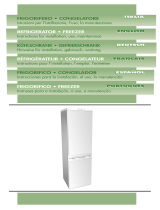
14
INSTALLATION
In order to avoid certain problems,
carefully read the safety instructions
before proceeding to install the appliance
Install the appliance in a well-ventilated,
damp-free room, away from any heat
source. Leave a minimum distance of
10cm between the top of the appliance
and any unit above it. If your installation
does not permit this, leave 5cm between
the height of the casing and any other
kitchen unit fixed to the wall and a gap of
2.5cm on each side of the appliance.
If your appliance must be installed next to
a refrigerator or freezer, you must maintain
a gap of 5cm at the sides to prevent
condensation from forming on the outside
of the appliance.
Your appliance’s climatic classification is
shown on the information plate. This
determines the ambient temperature range
for which the refrigeration unit is designed,
ensuring that the appliance will operate
correctly.
Class Ambient temperatures
N 16° to 32°
ST 18° to 38°
T 18° to 43°
ELECTRICAL CONNECTION
Socket characteristics: 220-240V with
Earth.
• Do not use adapters or extensions
• Prevent the cable from coming into
contact with the compressor.
• Prevent the cable from becoming caught
underneath the appliance.
The appliance’s electrical connection is
fitted with an Earth. For your safety,
connect the appliance to an effective
earthed socket (in accordance with the
standards in force regarding safe electrical
installation).
The manufacture refuses to accept any
liability for any damage that may be
caused through failure to earth the
appliance correctly.
BEFORE CONNECTION
• Clean the inside of the appliance with
bicarbonate diluted in warm water. Rinse
and dry carefully.
• Wait 2 hours before starting the appliance
to ensure that the lubricants in the
compressor unit have stabilised.
PROTECTION OF THE
ENVIRONMENT
This appliance does not contain any
refrigerant gases harmful to the ozone
layer in its refrigeration circuit and its
insulating materials. It must not be
scrapped with the urban rubbish and scrap
iron in order to avoid damaging the
refrigeration circuit and in particular the
back of the appliance. Contact your town
council for information on the collection of
these types of appliances.
The materials used in this appliance,
which are identified by this symbol, can be
recycled.
















